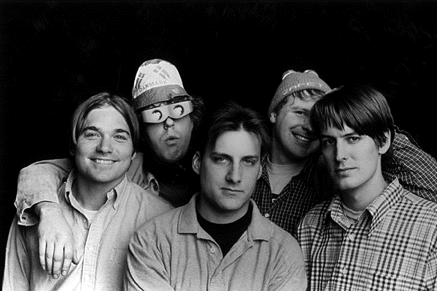Pavement in Central Park

Pavement
Rumsey Playfield, Central Park
New York, NY
September 21
On Tuesday night, Pavement performed their first of four shows as part of Central Park’s Summerstage concert series. It was almost one year ago to the day that Pavement broke headlines by announcing a single reunion show to take place on September 21, 2010 at Central Park. Many fans had purchased tickets back in the fall of 2009 to what was supposed to be a one-off performance (which sold out in two minutes). But, following the announcement of three additional shows in the park, and a world tour to precede them, these fans were forced to patiently watch as ticket prices fell below $20. Lead singer and guitarist Stephen Malkmus addressed the issue by joking that these were “the real first shows,” and that the ones leading up to it were “just warm ups.” Malkmus also nodded toward the drop in ticket prices, adding that this was “the way it should be” and several times thanked those who purchased tickets in advance. Leaving the show, few, if any, seemed disappointed by the performance they had waited so long to see.
The show started off with “Shady Lane” , a popular tune off Brighten the Corners, as Pavement’s dueling guitars rang out through the trees of Central Park for the first time of the night. However, the first few songs were greeted by a brief period of hesitance from the audience as many struggled to reconnect with the music from their youth. But once the band kicked into “Ell Ess Two,” (or “Elevate Me Later” ) the rest of the night played out like a reunion between two long-lost friends happy to be back in each other’s lives.
As the band and fans reacquainted themselves with one another, the audience reveled in the sound of Malkmus’ jangly, dissonant guitar lines and the often playful lyrics that accompany them. A collective howl erupted from the crowd during the popular hit “Stereo,” when Malkmus asked the fan-favorite question: “What about the voice of Geddy Lee? How did it get so high? I wonder if he speaks like an ordinary guy?” The band even took stabs at their age by adding that they were unable perform “Baptist Blacktick,” (an early Pavement song) as the song required a “young man screaming through a tube microphone” rather than a “middle-aged man through a…” . However, Kannberg was quick to add that, instead, perhaps the music was “too fast for this age group.”
Over the course of two hours, Pavement played twenty-eight songs (including a six song encore) that saw the band traverse much of their early musical catalog. From the outset, they displayed a relaxed group dynamic which served as a welcome departure from the tense, negative vibe that permeated from the stage leading up to their break-up in ‘99. There were, however, several misques and restarted songs. But, rather than become frustrated, the band members seemed to shrug these off as signs of their recent comeback. In the past, Malkmus would openly criticize band members for their mistakes; this time around, it seems a new-found sense of maturity has allowed them to move forward.
The second half of the show saw powerful renditions of many of the classic songs (Can they be considered classics yet?) that propelled Pavement’s rise to stardom in the mid-nineties. Malkmus even commented after their hit, “Gold Soundz” (which Phish covered in 1999), that this was “the supercharged version,” and asked fans to trust his judgment as he had “seen them all.” During “Fight This Generation” the band launched into an extended psychedelic jam that hinted at a potential future musical direction. The stellar first night Central Park came to a close with a six-song encore that produced two more highlight moments in “Silent Kid” and “Stop Breathin’.”
Amidst the wide-open surroundings of Central Park, Pavement created a very intimate vibe aided by minimalist stage lighting and lighthearted stage banter. Tuesday night’s show was a nostalgic experience for many – especially fans who had traded in their skateboards and wallet-chains for laptops and blackberries. But, it was when a nearby fan exclaimed, “Man, the 90’s were fun” that it became readily apparent that this is the music that defines an era. Pavement will always transcend the mid-nineties post-punk alternative rock movement that, in many ways, it created (today, we call it indie). And, after a night of songs that could easily be classified as the anthems of a generation, it became obvious that this music has a timeless quality, with an open door to progress.



















